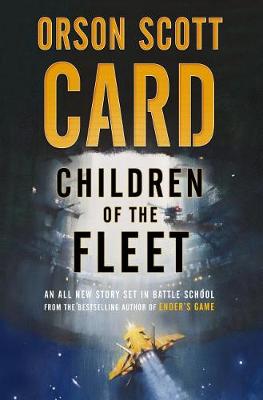Reviewed by Quirky Cat on
Full disclosure: I’m actually not fully caught up in Orson Scott Card’s works, and haven’t read any of the Formic Wars novels yet. Despite this I had no trouble keeping up with Children of the Fleet and quite enjoyed it. I think having read Ender’s Game first is probably a good idea, if not a requirement (you won’t understand the MinCol’s personality otherwise). Reading Ender’s Shadow first is also a good idea, but slightly less of a concern.
Children of the Fleet in many ways feels like Ender’s Game all over again, just with a new character. But that isn’t quite the truth of it; Dabeet Ochoa is a wildly different character from Ender, and equally as different from Bean. Dabeet is brilliant, yes, but not to the same level as Bean. He’s also no fighter like Ender, or as clever with strategies as him either. He is test smart though, and witty. Like the other boys, Dabeet is flawed in his own way (or really at all). He’s arrogant, small (too small to be a confident fighter), he doesn’t socialize well, and he is behind in almost everything compared to the rest of the Fleet students (with the obvious exception of testing).
Despite the similarities between the three books, don’t go into Children of the Fleet expecting to be reading the same book with a slight twist. This novel is much more focused on dialogue and Dabeet’s coming of age sort of story. There will be no dramatic battles in the battleroom like with Ender, and no sneaking around in the vents like Bean (Dabeet is small, but he isn’t that small). This is Dabeet’s story, through and through.
Dabeet’s character growth was probably one of the best parts about this book. He starts off as a brilliant but petulant child, convinced he’s smarter and therefore better than everyone around him. By the end he’s, well I wouldn’t say humble but certainly more modest and more appreciative of what he has (like his new found friends). Over the course of the book we see Dabeet constantly learn to self-analyze and see the faults in himself. It isn’t until the end that he learns that faults aren’t a bad thing; it just means he has more work to do.
Adding on to all of this is seeing Dabeet struggle to figure out how friends and friendships work. He thinks he’s found a friend in Zhang He, but he isn’t quite sure. Zhang He is willing to point out flaws and tease him, something Dabeet isn’t expecting or really prepared for. Adding to this difficulty is the way Dabeet communicates; he has no problem telling a kid when he’s wrong, or talking to him like he’s unintelligent. He’s braggy (behind his back he is called Test Boy) and doesn’t take criticism well. Thinking the friendship is lost, but accepting a level of mutual respect between them, Dabeet assumes that’s all he’ll ever have. Until Monkey (not her real name, but Fleet School keeps up the tradition of nicknames). She’s good at getting through to Dabeet, and makes up for many of the social skills Dabeet lacks. She’s ok with calling him out when he’s being rude or selfish or any other adjective he’s fitting at the moment. With her help Dabeet really does figure out what a friendship entails; the hardest element for him being trust.
What I really loved about Children of the Fleet was all of the mind games that were going on. Each character had their own spin on things, their own way of seeing the world that added to the complexity of the full view of it. Whenever one set of circumstances is presented, we’re immediately shown the alternative ways of interpreting it, or how the lack of information provided could mean countless other scenarios. The puzzle Dabeet gets himself trapped in isn’t a simple one, and it takes the entire Building Team to resolve it (heaven forbid the adults step in and resolve things, as per usual with Battle/Fleet School).
I really enjoyed reading Children of the Fleet, it was a fascinating character study and stratagem story. As a bonus, diving back into the world Orson Scott Card has created has motivated me to continue with getting caught up with the rest of the series, something I hope to do shortly.
For more reviews, check out Quirky Cat's Fat Stacks
Reading updates
- Started reading
- 29 October, 2017: Finished reading
- 29 October, 2017: Reviewed
